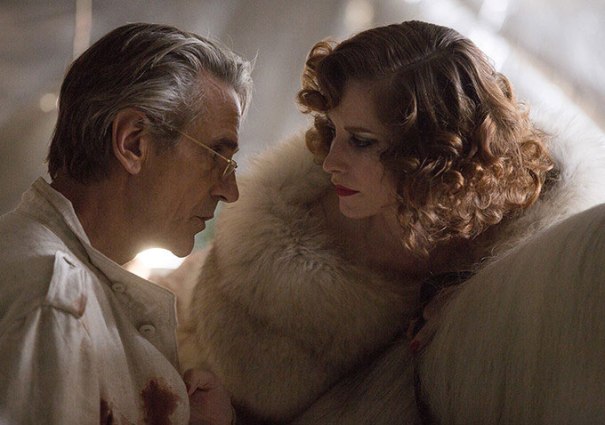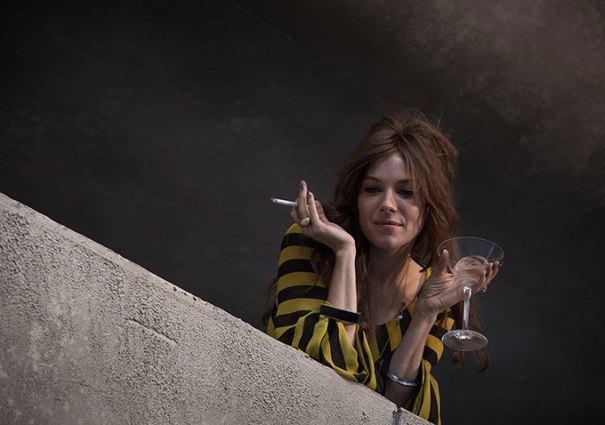High-Rise | reviews, news & interviews
High-Rise
High-Rise
Tom Hiddleston suffers Ballardian ultra-violence in a Seventies tower block

Dr Robert Laing (Tom Hiddleston) feels he’s “living in a future that had already taken place”. Director Ben Wheatley, too, has made a late-arriving Seventies exploitation pic from JG Ballard’s 1975 novel. High-Rise is a highly sexy and violent look through a distorting lens at both that familiar past, and the way we live now.
Like many similar Ballard tales, its dystopia is cleanly simple, with architect Royal (Jeremy Irons) living in Bourbon splendour with wife Ann (Keeley Hawes) at the top of his new, self-sufficient tower-block. In lower floors, like a concrete Titanic, malfunctions multiply and social oppressions and resentments fester, till the block becomes an island: a little, festering England, going down the drain.
 Nic Roeg was producer Jeremy Thomas’s original choice to direct this long-gestating project, when it would have been a roughly contemporary film. Wheatley, like Roeg then, is Britain’s most brilliant director, and with screenwriter wife Amy Jump has seized on his first decent budget and starry cast with reckless gusto. Irons’s cold-blooded, epicene mad scientist (pictured above right with Keeley Hawes), and Hiddleston, watching events with shaky rationality from the equilibrium of the middle floors, are joined by Sienna Miller (pictured below left), superb as a flirty, wry widow, Hobbit star Luke Evans’s dangerously violent blowhard, and Elisabeth Moss as his belittled, pregnant wife.
Nic Roeg was producer Jeremy Thomas’s original choice to direct this long-gestating project, when it would have been a roughly contemporary film. Wheatley, like Roeg then, is Britain’s most brilliant director, and with screenwriter wife Amy Jump has seized on his first decent budget and starry cast with reckless gusto. Irons’s cold-blooded, epicene mad scientist (pictured above right with Keeley Hawes), and Hiddleston, watching events with shaky rationality from the equilibrium of the middle floors, are joined by Sienna Miller (pictured below left), superb as a flirty, wry widow, Hobbit star Luke Evans’s dangerously violent blowhard, and Elisabeth Moss as his belittled, pregnant wife.
The Seventies was a golden age for British pulp fiction (Wheatley would also have the nerve for James Herbert’s The Rats), with “the old ultra-violence” of Kubrick’s A Clockwork Orange, like Ballard, part of a climate of gleeful, often grubby extremity. Wheatley nods to this with a glimpse of the infamous “AGGRO! KIDS RULE OK!” cover of a 1976 Action comic, with a chain-wielding young thug threatening a cowering adult, a police helmet by his side. Despite opening High-Rise with Hiddleston roasting a dog, Wheatley and Jump aren’t so crass. They plug into a broader, more colourfully sensual pulp energy, in which Clint Mansell’s orchestral version of Abba’s “SOS” signals the upper floors’ Versailles decadence, Portishead’s later version announces the rot setting in, and rape and riot fuel a sensational carnival. Rape, a highly exploitative Seventies cinema staple, is suffered by one character here with more obvious, upsetting violence than in the book. But Wheatley, the most responsible of transgressive directors, is sensitive in stopping when the pain is understood and, like Ballard, doesn’t leave the gender war within the class one there.
 Ramped-up sensation is Wheatley’s gift to British cinema, so often stagey and timidly literal. He’s yet to match Kill List’s shattering dread and violence, and maybe doesn’t care to; every film since, even A Field In England’s psychotropic 17th century nightmare, has felt like relatively soft relief. He’s also politically radical, though final words here from Margaret Thatcher are unfortunately needed to tether High-Rise’s metaphor to London’s schismed present. I suspect I’ll revel in the pleasures here in future viewings. Still, for a film only two hours long, its episodic nature becomes wearing. Points are aimlessly circled back to, much as the floors’ inhabitants do once entropy sets in. As with Royal’s tower, there’s a structural fault.
Ramped-up sensation is Wheatley’s gift to British cinema, so often stagey and timidly literal. He’s yet to match Kill List’s shattering dread and violence, and maybe doesn’t care to; every film since, even A Field In England’s psychotropic 17th century nightmare, has felt like relatively soft relief. He’s also politically radical, though final words here from Margaret Thatcher are unfortunately needed to tether High-Rise’s metaphor to London’s schismed present. I suspect I’ll revel in the pleasures here in future viewings. Still, for a film only two hours long, its episodic nature becomes wearing. Points are aimlessly circled back to, much as the floors’ inhabitants do once entropy sets in. As with Royal’s tower, there’s a structural fault.
Overleaf: watch the trailer for High-Rise
Add comment
The future of Arts Journalism
You can stop theartsdesk.com closing!
We urgently need financing to survive. Our fundraising drive has thus far raised £49,000 but we need to reach £100,000 or we will be forced to close. Please contribute here: https://gofund.me/c3f6033d
And if you can forward this information to anyone who might assist, we’d be grateful.

Subscribe to theartsdesk.com
Thank you for continuing to read our work on theartsdesk.com. For unlimited access to every article in its entirety, including our archive of more than 15,000 pieces, we're asking for £5 per month or £40 per year. We feel it's a very good deal, and hope you do too.
To take a subscription now simply click here.
And if you're looking for that extra gift for a friend or family member, why not treat them to a theartsdesk.com gift subscription?
more Film
 Die My Love review - good lovin' gone bad
A magnetic Jennifer Lawrence dominates Lynne Ramsay's dark psychological drama
Die My Love review - good lovin' gone bad
A magnetic Jennifer Lawrence dominates Lynne Ramsay's dark psychological drama
 Bugonia review - Yorgos Lanthimos on aliens, bees and conspiracy theories
Emma Stone and Jesse Plemons excel in a marvellously deranged black comedy
Bugonia review - Yorgos Lanthimos on aliens, bees and conspiracy theories
Emma Stone and Jesse Plemons excel in a marvellously deranged black comedy
 theartsdesk Q&A: director Kelly Reichardt on 'The Mastermind' and reliving the 1970s
The independent filmmaker discusses her intimate heist movie
theartsdesk Q&A: director Kelly Reichardt on 'The Mastermind' and reliving the 1970s
The independent filmmaker discusses her intimate heist movie
 Blu-ray: Wendy and Lucy
Down-and-out in rural Oregon: Kelly Reichardt's third feature packs a huge punch
Blu-ray: Wendy and Lucy
Down-and-out in rural Oregon: Kelly Reichardt's third feature packs a huge punch
 The Mastermind review - another slim but nourishing slice of Americana from Kelly Reichardt
Josh O'Connor is perfect casting as a cocky middle-class American adrift in the 1970s
The Mastermind review - another slim but nourishing slice of Americana from Kelly Reichardt
Josh O'Connor is perfect casting as a cocky middle-class American adrift in the 1970s
 Springsteen: Deliver Me From Nowhere review - the story of the Boss who isn't boss of his own head
A brooding trip on the Bruce Springsteen highway of hard knocks
Springsteen: Deliver Me From Nowhere review - the story of the Boss who isn't boss of his own head
A brooding trip on the Bruce Springsteen highway of hard knocks
 The Perfect Neighbor, Netflix review - Florida found-footage documentary is a harrowing watch
Sundance winner chronicles a death that should have been prevented
The Perfect Neighbor, Netflix review - Florida found-footage documentary is a harrowing watch
Sundance winner chronicles a death that should have been prevented
 Blu-ray: Le Quai des Brumes
Love twinkles in the gloom of Marcel Carné’s fogbound French poetic realist classic
Blu-ray: Le Quai des Brumes
Love twinkles in the gloom of Marcel Carné’s fogbound French poetic realist classic
 Frankenstein review - the Prometheus of the charnel house
Guillermo del Toro is fitfully inspired, but often lost in long-held ambitions
Frankenstein review - the Prometheus of the charnel house
Guillermo del Toro is fitfully inspired, but often lost in long-held ambitions
 London Film Festival 2025 - a Korean masterclass in black comedy and a Camus classic effectively realised
New films from Park Chan-wook, Gianfranco Rosi, François Ozon, Ildikó Enyedi and more
London Film Festival 2025 - a Korean masterclass in black comedy and a Camus classic effectively realised
New films from Park Chan-wook, Gianfranco Rosi, François Ozon, Ildikó Enyedi and more
 After the Hunt review - muddled #MeToo provocation
Julia Roberts excels despite misfiring drama
After the Hunt review - muddled #MeToo provocation
Julia Roberts excels despite misfiring drama
 London Film Festival 2025 - Bradley Cooper channels John Bishop, the Boss goes to Nebraska, and a French pandemic
... not to mention Kristen Stewart's directing debut and a punchy prison drama
London Film Festival 2025 - Bradley Cooper channels John Bishop, the Boss goes to Nebraska, and a French pandemic
... not to mention Kristen Stewart's directing debut and a punchy prison drama

Comments
Triumph of considerable style
Triumph of considerable style over ever-dwindling substance. Is the book really this thin? Vague characterisations - hard-pressed to work out which of the minor characters where which - and Hiddleston seems to be playing himself. Loved many of the contrasts in the varied musical score, though, especially the treatment of SOS.